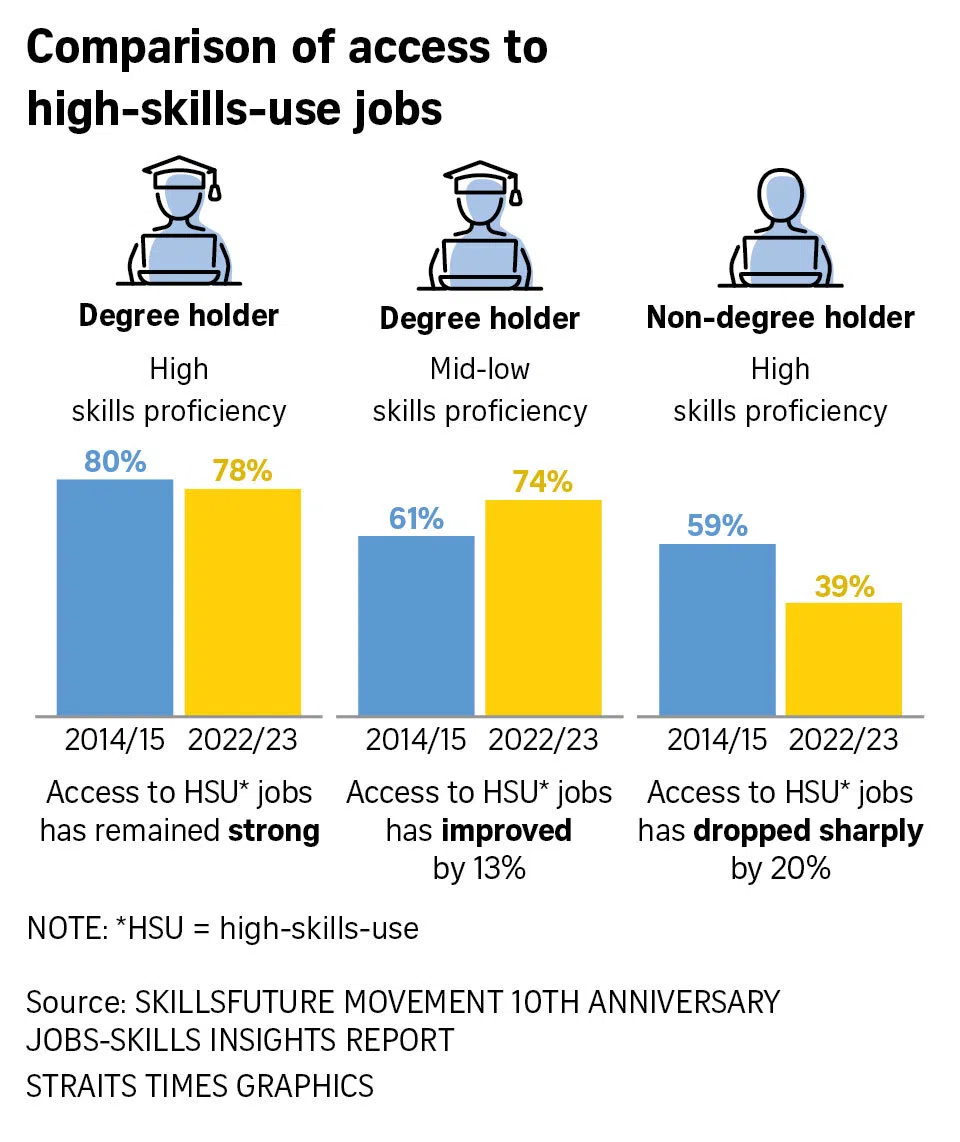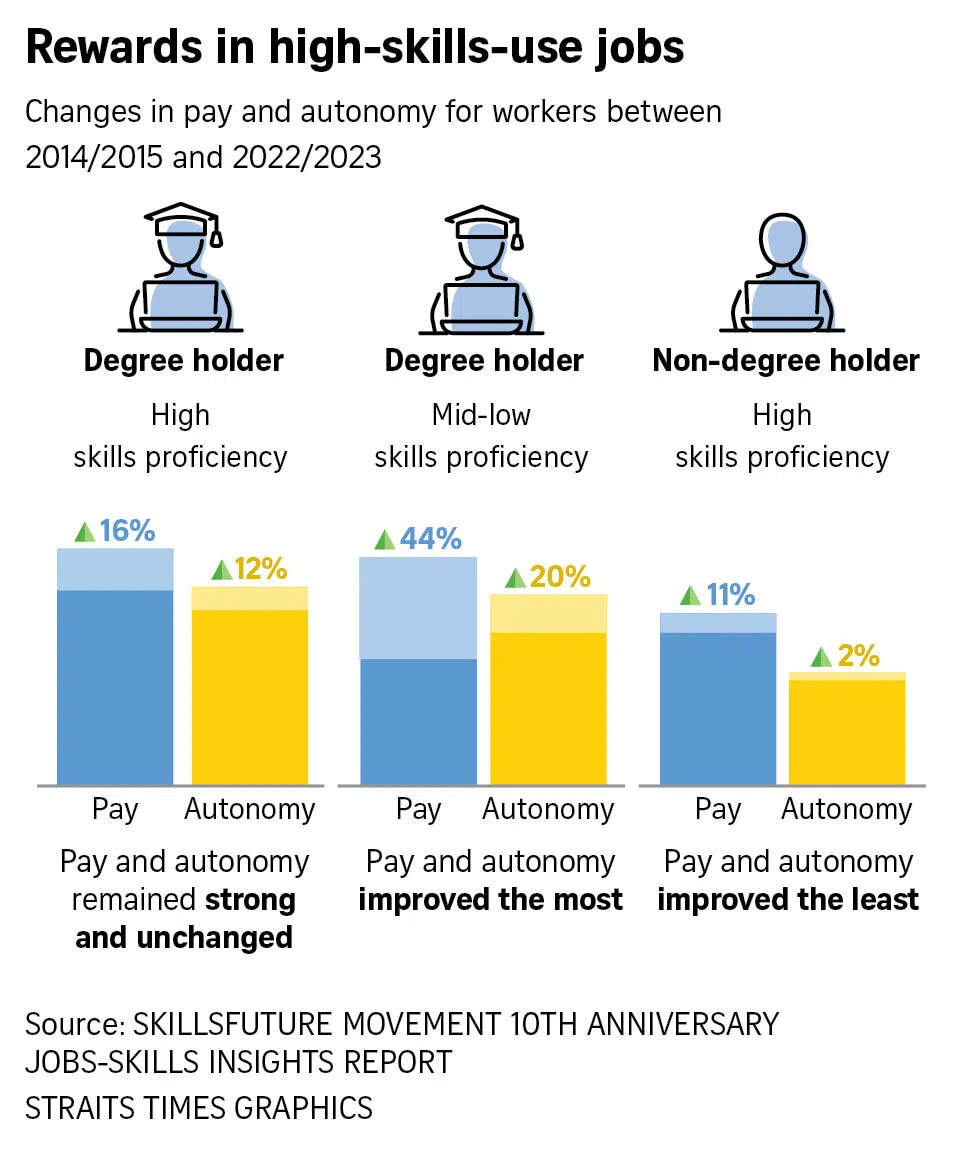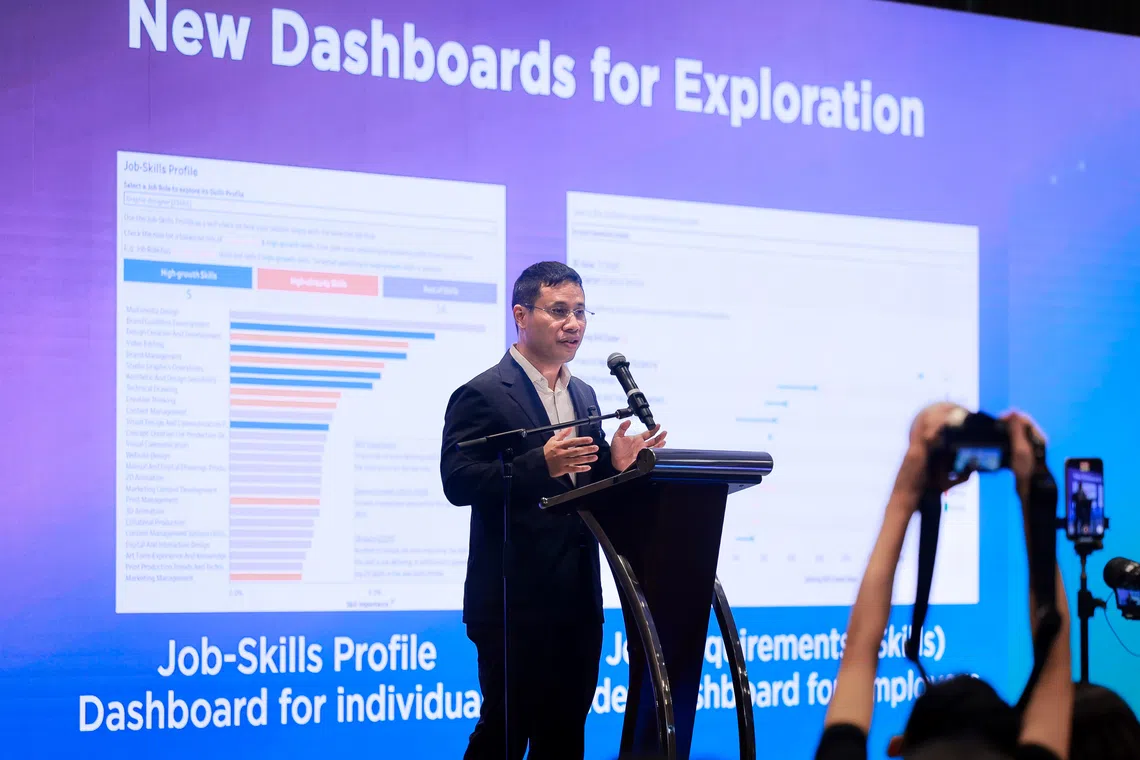Degree holders gain more as over 5 in 10 S’pore workers see significant changes at workplace: Report
Sign up now: Get tips on how to grow your career and money

Highly skilled non-degree-holders saw minimal improvement, even if some of them have a high proficiency in literacy and numeracy skills.
ST PHOTO: CHONG JUN LIANG
SINGAPORE – Degree holders are more likely to land jobs that require a high skill level and gain more pay than those without a degree, amid significant changes taking shape at workplaces.
According to the Jobs-Skills Insights Report released on Oct 10, 56 per cent of Singapore workers have reported more opportunities for job-related training and workplace learning as the workplace transforms.
However, degree holders benefit more from these opportunities, showing gains in skills use, pay and autonomy compared with non-degree holders, who saw minimal improvement. The report’s analysis found that not all degree holders are highly proficient in literacy and numeracy skills, and not all who are highly proficient in these skills hold degrees.
However, even if degree holders had lower literacy and numeracy skills than non-degree holders, they were much more likely to be hired for high-skilled jobs. Their chances of doing so have risen from 61 per cent 10 years ago, to 74 per cent, nearly matching those of highly skilled degree holders at 78 per cent.
Highly skilled non-degree holders are finding it harder to secure such jobs, with their chances falling from 59 per cent to 39 cent.

Degree holders with moderate or lower skill levels have also made the biggest gains in both pay and workplace autonomy, catching up with their highly skilled peers.
In contrast, non-degree holders with strong skills have seen little improvement, even though their abilities are on a par with those of skilled degree holders.

The report also found that the degree-holding managers and professionals are in jobs where the skills required become increasingly complex over time.
For diploma holders and below, their jobs remain simpler. Although nearly 40 per cent of them are highly proficient in literacy and numeracy skills, they have fewer growth opportunities.
Launched to commemorate the 10th anniversary of the SkillsFuture movement, the report by SkillsFuture Singapore (SSG) and Workforce Singapore (WSG) spotlights the latest jobs-skills trends in efforts to shape a skills-first workforce.
Education Minister Desmond Lee said Singapore needs to double down on its efforts to move to a skills-first approach if it is to thrive amid rapid change.
While qualifications remain relevant because they signal the skills that an individual has, they cannot be the only deciding factor for employers, he explained.
“If we rely on qualifications alone, we will miss out on the capabilities and experience that formal qualifications do not capture... Individuals could also have picked up skills in the workplace, which may not be reflected in these qualifications,” Mr Lee said at the launch of the Centre for Skills-First Practices at the Lifelong Learning Institute on Oct 10.
“This does not mean that we have to choose only skills or qualifications… Rather, a skills-first approach means that we put the focus on skills in hiring, training and career progression,” said Mr Lee, who is also Minister-in-Charge of Social Services Integration.
To make a skills-first approach possible, he said three things need to happen.
Businesses need to proactively identify and invest in the skills of their workers. Individuals need to be deliberate in their training and career choices. And training providers need to accurately meet these skills needs with training.
Skills driving workforce transformation
The report’s analysis used results from the Programme for the International Assessment of Adult Competencies (PIAAC) data from 2014/15 to 2022/23.
The PIAAC study identified five key skills driving workplace transformation across all industries.
Literacy – tasks that involve reading and writing
Influence – work that involves persuading and negotiating with others
Collaboration – time spent working collaboratively with co-workers
ICT – use of digital devices
Horizontal interaction – collaborative tasks like training others and giving presentations
The report indicates that these abilities are consistently linked to change, regardless of occupation or sector.

Education Minister Desmond Lee speaking at the launch of the Centre for Skills-First Practices at the Lifelong Learning Institute on Oct 10.
ST PHOTO: GAVIN FOO
New dashboards to monitor evolving skills
SSG released two new dashboards on the Jobs-Skills Portal to help employers and individuals track evolving skill requirements.
The Job Requirement (Skills) Index dashboard provides employers with insights on how skills demands are shifting among 849 job roles across sectors.
Users can monitor which skills are becoming increasingly important in their industries.
The second dashboard, Jobs-Skills Profile, unpacks the top skills, across 941 listed, that employers are seeking in different job roles.
A spokeswoman for SSG said: “(This) dashboard enables workers at any career stage to assess which skills offer the greatest potential for career mobility and long-term employability, and make proactive career plans and targeted training decisions in a rapidly changing job market.”
These new tools meet a wider range of user needs, compared with previous dashboards which provide insights into career pathways and skills at the job and economy levels, she said.
Training providers can also use these tools to develop and refine training programmes accordingly.



